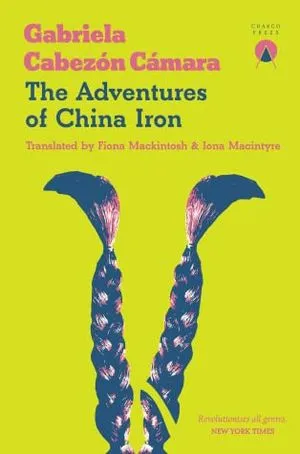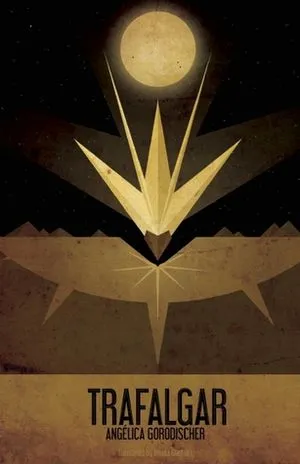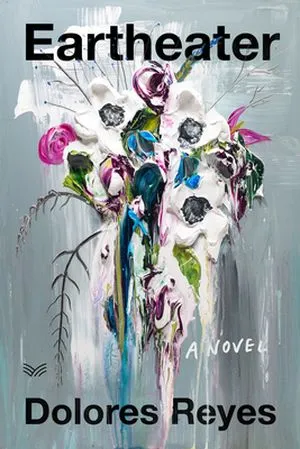
15 Argentinian Books Available in English Translation
As I’ve gotten deeper and deeper into my love of books in translation, I’ve been able to fall in love with many an Argentine author. I already knew some small piece of the classics — The Invention of Morel by Adolfo Bioy Casares; Kiss of the Spider Woman by Manuel Puig; Hopscotch by Julio Cortázar. And of course, Ficciones by the incredible Jorge Luis Borges, which I loved so much that I dissected many of its stories in my undergraduate senior thesis.
But I left them off the list. They’re worth reading (even must-reads), but they’re also easily discovered. There is such a wealth of fantastic literature coming out from Argentina to highlight — whether they be modern treasures or classics that are lesser known in the U.S. Writing these lists is a joy: while the search can sometimes be tough, it gives me an opportunity — an excuse — to dig deep into some incredible books that I might have otherwise, tragically, not discovered.
So read on, and enjoy. These 15 Argentinian books have been translated from Spanish into English and available in the U.S. And what a joy that is: they are ready to be in your hands, shocking you, scaring you, impacting you, soothing you, as you bury yourself in their pages.
Please note that while I took great care to list content warnings when I could, sometimes things fall through the cracks. Please do additional research on the recommended titles if needed.

The Adventures of China Iron by Gabriela Cabezón Cámara, Translated by Fiona Mackintosh and Iona Macintyre
When her husband is called on to join the army, China is thrilled: freedom, she thinks, at last. She leaves her children with their grandparents and ends up on a liberating, queer coming-of-age adventure with a Scottish woman named Liz. They bump over the Pampas, and she learns first-hand the violent cruelties of imperialism and patriarchal rule, while also discovering new things about her gender identity and sexuality. It’s a subversive, trippy, witty novel, sapphic, satiric, and full of joy and lavender. (This novel is loosely based on the epic gaucho poem Martin Fierro, but that isn’t necessary reading for Cámara’s subversive take on the story.)
Content warnings for depictions of graphic violence and torture, rape, imperialism, racism, anti-Indigenous violence and language.
Optic Nerve by Maria Gainza, Translated by Thomas Bunstead
This novel’s chapters almost read like personal essays about the protagonist’s life, bordering that sweet line between autobiographical fiction and fictionalized memoir. The protagonist weaves her love of art, stories of the lives of artists such as Rothko and El Greco, into anecdotes about moments that had real impact on her life. I identified with the protagonist’s anticipatory anxiety; she deals with a heavy disquiet and a fear of airplanes, and scenes of turmoil, from a stormy sea to a hunting scene, appeal to her in ways she attempts to explain. It’s rich and intimate even as she keeps us at a distance. Argentine art critic Maria Gainza pulled from her own psyche for this delicate novel.
Dead Girls by Selva Almada, Translated by Annie McDermott
Almada’s work of creative nonfiction focuses on three unsolved murders of young women in Argentina. As Almada interviews family members, she reveals the ways that people talk about and tell the stories of the victims, and shares her own personal experiences, weaving in other true stories, in a way that really gets at the pain and fear of being a woman in such a violent world. She exposes the horrors of femicide, domestic violence, and rape culture, and her sharing evokes a really empowering sense of solidarity even as the stories hit hard.
Content warnings for violence and abuse, rape, racist language (‘G’ slur), sexism, femicide.

Tender is the Flesh by Agustina Bazterrica, Translated by Sarah Moses
When a virus poisons all animal meat, humanity is thrown into a crisis, and governments make a dubious decision: all human meat — sorry, “special meat” — is now legal, and breeding and processing can begin. Marcos just does his job. He cares for the specimens and crunches the numbers. He has too much to deal with — his estranged wife, his ill father — to think about the whole operation, or what it actually is. Then one day, despite the rules and regulations, he starts to treat a specimen as a human — and things begin to shift. It’s a brutal story, eerie and dark.
Content warnings for cannibalism, graphic violence, rape, suicide, homophobia, racism.
The Linden Tree by Cesar Aira, Translated by Chris Andrews
This is such a short book at just 91 pages, but it contains so much. It’s an autobiographical novel — or fictionalized memoir, depending on how you look at it — about a man looking back at his youth as a young boy growing up in Pringles, Argentina. It’s a philosophical story about nostalgia, growing up, our relationship with our past, and how we discover “the ways things are.” When he was young, Perón was in charge and his father had power in town; now, no one in the town can use Perón’s name, and his father is struggling. It’s such a short book but will leave you with a lot to think about.
August by Romina Paula, Translated by Jennifer Croft
In this short novel by Romina Paula, a young women returns to Patagonia to help scatter her childhood best friend’s ashes. This apathetic and self-destructive woman doesn’t know how to face her hometown, the almost-familiar streets that she walked away from, let alone how to face the world where her friend died by suicide. And then Emilia meets Julian, the man she dated when she was younger, and her anxiety rises. It’s an honest and difficult story told in an anxious ramble.
Content warnings for sexual assault, violence, and suicide.

Trafalgar by Angélica Gorodischer, Translated by Amalia Gladhart
Sit down at the Burgundy across from Trafalgar Medrano, and if you’re lucky, and patient, he might just tell you a story about his travels over seven double coffees. And while he might act like any other business man, his import-exports business takes place far off into the stars: he drives his clunker from adventure to adventure. Our narrator is a witty woman who takes none of his BS. This collection of Gorodischer’s tales is rich, fun, and intensely Borgesian, and I’m not exaggerating when I say that I would read five more volumes of Trafalgar stories if I could. At the very least, I plan to get my hands on other titles by Gorodischer. Some fun facts: her book Kalpa Imperial: The Greatest Empire That Never Was was translated by the one and only Ursula K. Le Guin; she was presented the World Fantasy Lifetime Achievement Award in 2011; and she is now 93 and has lived almost all her life in Rosario, Argentina.
Content warnings for ableism, use of the ‘R’ slur.
The Tango Singer by Tomás Eloy Martínez, Translated by Anne McLean
American grad student Bruno Cadogan comes to Buenos Aires in 2001 for a single purpose: to find the best tango singer in the world, a man who has never recorded, who only performs at unannounced, seemingly spontaneous gigs. As Cadogan explores a chaotic Buenos Aires — economic tension high, inflation spiraling, street demonstrations common — all while accompanied by a male friend who is perhaps more than platonic, he begins to discover a Borgesian labyrinth of sorts, a mysterious pattern that emerges around the singer’s ‘randomly chosen’ performance locations.

Eartheater by Dolores Reyes, Translated by Julia Sanches
In this strange, dark story, a girl’s craving for soil alienates the people around her, especially when her first taste reveals to her the circumstances around her mother’s death. As she grows into a young woman, living with her loyal brother, word begins to spread about her ability: a taste of earth, and she can see visions of people who are missing or murdered. People begin to appear at their door, desperate and willing to try anything to find their loved ones, and discover the truth. It’s an eerie and compelling read driven by the narrator’s honest and rich voice.
Content warnings for rape, murder, pedophilia, violence, drug use, domestic violence.
Fever Dream by Samanta Schweblin, Translated by Megan McDowell
In just 183 pages, Schweblin comes through with a punch of a story that left my heart pounding long after the final page. A woman is dying — a boy speaks to her — they unpack how they got to this point. It’s tense and suspenseful, surrealist horror, eerie and cruel. A mother and her desperate love and determination to protect her daughter fuel this short novel about pollution, poison, and heartache, that took me completely by surprise. Schweblin is also the author of collection Mouthful of Birds and novel Little Eyes.
Content warnings: body horror, animal abuse, child death.
Thus Were Their Faces by Silvina Ocampo, Translated by Daniel Balderston
This is a brilliant collection of short stories by Silvina Ocampo, an iconic but under-appreciated author, AKA the brilliant fiction writer who Borges named “one of the greatest poets in the Spanish language, whether on this side of the ocean or on the other.” In “The House Made of Sugar,” Cristina insists to her husband that they can’t occupy a house where anyone has lived before them; in “The Photographs,” people are so busy celebrating a “miracle” that they neglect the very girl who has been healed, a brutal takedown of performative compassion. Ocampo’s stories are uncanny, featuring the pain of growing up and the male gaze, featuring vanity, dreams, heat, greed.

All My Goodbyes by Mariana Dimopulos, Translated by Alice Whitmore
The narrator of All My Goodbyes is intensely frustrating to the people around her — she is ever-moving, ever-changing. Whenever things start to seem overwhelmingly normal, familiar, in a place where she lives, she feels the urge to flee and start all over. She’s fled her home of Buenos Aires, she’s fled Berlin, and many a city in between, abandoning people who cared for her, before she comes to a small town in Patagonia where a murder will eventually take place. The storylines cross and turn over one another, the goodbyes overlapping, the arrivals shifting. The enigmatic narrator in her self-imposed isolation and the lyrical, quick place of the novel come together to form a disconcerting novel about feeling lost.
Things We Lost in the Fire: Stories by Mariana Enriquez, Translated by Megan McDowell
Enriquez’s stories in this collection are surreal and gothic horror, mixed with political and social critique — emotionally arresting tales of grisly murders and heartbreaking poverty alongside ghosts and frightening children. The protagonists are “difficult” women, struggling with semi-abusive relationships with men, strong and determined to survive, stubborn even when afraid. “Spiderweb” and “Adela’s House” are particular favorites of mine, but I’m in love with everything she’s written — and her abrupt endings will leave you completely adrift.
Content warnings: drug abuse, violence, body horror, child abuse, animal cruelty, miscarriage, suicide, ableism, sexual assault, self-harm.
My Father’s Ghost is Climbing in the Rain by Patricio Pron, Translated by Mara Faye Lethem
When a young author comes home to Argentina to see his dying father, he is confronted with painful memories. And then he stumbles on a series of papers that show his journalist father was recently obsessed with recovering the story of a local man who disappeared during the 1970s Dirty War. As the young writer tries to put together his parents’ lives during the time of the disappearances, he also uncovers the dark history of his country and its memory and survivors. It’s a compelling story that’s illuminated in interesting format — newspaper clippings, for example, describing the disappearance of Alberto Burdisso. It’s also an autobiographical story by Pron, which adds a dark reality to its pages.
Content warnings: violence.

People in the Room by Norah Lange, Translated by Charlotte Whittle
A young woman catches sight of three older women across the way, and begins to spy on them, weaving stories around their lives. And one day, she receives a telegram meant for them. What does it mean? And should she go inside, and risk meeting them? Norah Lange’s novel is an eerie story about a girl who is lonely, bored, and full of melancholy, whose only tie to reality seems to be the three women and the stories she’s woven around them. She projects her hopes for excitement — for gothic mystery — and her desperate, dark thoughts of suicide and death, all onto them. She is a young woman, schooled to do little but sit and think and read, feeling lost in the painfully claustrophobic domestic realm. Lange was a contemporary and friend to Jorge Luis Borges and Silvina Ocampo, and this is considered her masterpiece, an existential, experimental novel of repressed pain.
Content warnings for animal death, suicidal ideation, discussion of suicide.
Do you know of more fantastic Argentinian literature that I should check out? Let me know on Twitter. For more books in translation to discover, take this quiz on books for Women in Translation month (and beyond)!







